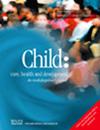Development of Self-Management Skills in 14- to 16-Year-Old Adolescents with Chronic Health Conditions: A Qualitative Study
Abstract
Background
The American Academy of Pediatrics recommends that adolescents with chronic health conditions begin to assume responsibility for their own care by age 14. The goal of this qualitative one-time interview study is to learn how 14- to 16-year-old adolescents with chronic health conditions begin to develop self-management skills and the role that caregivers play in the learning process.
Methods
Twenty adolescents ages 14–16 with chronic renal (n = 5), gastrointestinal (n = 5), hematologic (n = 5), or rheumatologic (n = 5) diseases, and 20 caregivers (dyads), completed individual semi-structured interviews discussing the adolescents' current degree of self-management. Six coders analyzed transcripts using thematic framework analysis.
Results
Three primary themes emerged: continuum, motivations, and tools. Both adolescents and caregivers described progress along a self-management continuum with varying levels of responsibility for the adolescents, ranging from passive to responsible. Caregivers' behaviors similarly varied from directive management to supported self-management. Motivations for self-management skills were described in relation to one's health, self, and others. Families utilized a variety of tools to facilitate movement toward supported self-management with the adolescent.
Conclusions
The development of adolescent self-management of their chronic condition is a complex, shifting continuum between caregiver and adolescent. This continuum may be impacted by adolescent motivation and tools/problem solving available to the family. Pediatric healthcare providers can support self-management by assessing and attending to each patient's motivations; building a road map individualized to each patient's skills; and offering time in outpatient clinic to practice self-management strategies.

 求助内容:
求助内容: 应助结果提醒方式:
应助结果提醒方式:


